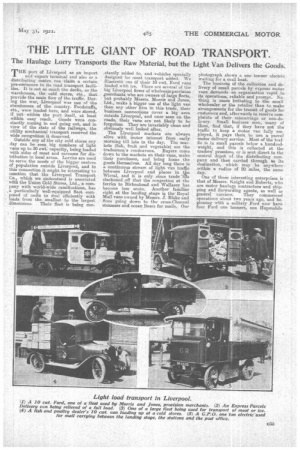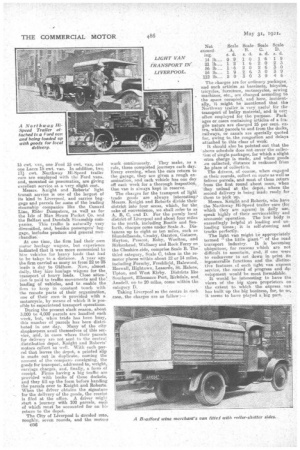THE LITTLE GIANT OF ROAD TRANSPORT.
Page 37

Page 38

If you've noticed an error in this article please click here to report it so we can fix it.
The Haulage Lorry Transports the Raw Material, but the Light Van Delivers the Goods.
THE port of Liverpool as an import awl .export terminal and also as a distributing centre can claim a certain pre-eminence in its road transport facilities. It is not so much the docks, as the warehouses, the cold stores, etc., that provide the main flow of the traffic. During the war, Liverpool was one of the storehouses . of the country. Foodstuffs, etc., were landed here, and were stored, if not withis the port itself, at least within easy reach. Goods were constantly coming in and going out, and in view of the state of the railways, the utility mechanical transport received the wide recognition it deserved.
Outside any of the city cold stores any day can be seen big numbers of light vans up to 30 cwt: capacity, being loaded with sides of meat and carcases for distribution in local areas. Lorries are used to serve the needs of the bigger centres of population outside Liverpool, and in this connection it might be interesting to mention that the Liverpool Transport Co., which we understand is associated with the Union Cold Stores, Ltd., a company with world-wide ramifications, has ,a particularly well-equipped fleet composed of units to deal efficiently with loads from the smallest te the largest dimensions. Their fleet is being con
.stantly -added to, and .vehicles specially designed for meat transport added. We illustrate rifle of their 10 cwt. Ford vans loaded with ice. There are several of the big Liverpool firms of wholesale provision „merchants who are owners of large fleets, but probably Messrs. Morris and Jones, Ltd., make a bigger use of the light van than any other firm in this trade, their business connections cover a big area outside Liverpool, and once seen on the roads, their vans are not likely to be forgotten They are invariably clean and obviously well looked after.
The Liverpool markets are always alive with motor interest from early morning till late in the day. The markets (fish, fruit and vegetable) are the tradesmen's rendezvous. Buyers come down to the markets on their vans, make their purchases, and bring home the goods themselves. All day long there is a continuous stream of light van traffic between Liverpool and places in tlte Wirral, and it is only since trade 'Rs slackened off that the congestion at the ferries to Birkenhead and 'Wallasey has become less acute. Another familiar sight at the landing stage is the Royal Mail vans owned by Messrs. J. Blake and Sons going down to the cross-Channel steamers and ocean liners for mails. Our photograph shows a one tonner electric waiting for a mail boat.
The business of the collection and delivery of small parcels by express motor vans demands an organization 'rapid in its operations, reliable and prompt. Nothine is more irritating to the small wholesaler or the retailer than to make arrangements for the transit of goods for customers and, afterwards to receive complaints of their miscarriage or non-delivery. Small business men, many of them, find that, if they have not the traffic to keep a motor van fully employed, it pays them to use a parcel motor delivery service. Most of the traf. fic is in small parcels below a hundredweight, and this is collected at the traders' premises, or is sent direct to the central depot of the distributing company and then carried through to its destination, which may be anywhere within a radius of 20 miles, the same day.
One of these interesting enterprises is that of Messrs. Knight and Roberts, who are motor haulage contractors and shipping and forwarding agents, as well as general carriers. They commenced operations about two years ago, and beginning with a solitary Ford now have four Ford one tonners, one Hupmobile 15 cwt. van, one Ford 15 cwt. van, and one Laere 15 cwt. van. In addition, two 17i cwt. Northway Hi-Speed trailer ears are employed with the Ford vans, and, mounted on pneumatics, are giving excellent service at a very slight cost.
Messrs. Knight and Roberts light transit service is one of the largest of ite kind in Liverpool, and carries baggage and parcels tor some of the leading steamship companies like the Cunard Line, Elder Dempsters, as well as for the Isle of Man Steam Packet Co. and the Belfast and Dundalk Steamship coinpanies. This traffie is naturally very diversified, and, besides passengers' luggage, includes produce and general merchandise:
At one time, the firm had their own motor haulage wagons, but experience indicated that it was more economical to hire vehicles for heavy loads that had to be taken to .a distance. A year ago the firm carried as many as from 22 to 25 loads a day to Oldham. Now, almost. daily, they hire haulage wagons for the transport of heavy loads. Close attention is paid to traffic movements and the, loading Of vehicles, and to. enable the firin to keep in constant touch with the remote parts of their organization, one of their men is provided with a motorcycle, by means of which it is possible to superintend transport operations.
During the present slack season, about 3,000 to 4,000 parcels are handled each week, but, when trade has been busy, this number of parcels has been distriheted in one day. Many of the city shopkeepers avail themselves of this service, and, in eases where their parcels fey delivery are not sent to the central distribution depot, Knight and Roberts' motors' collect as well. With each parcel that leaves the depot, a printed slip is made out in duplicate,, naming the account of the company. consigning, the goods for transport, addressed to, weight, carriage charges, and, finally, a form of receipt. Firms having a big traffic are provided with books of these dockets, and they fill up the form before handing the parcels over to Knight and Roberts. When the driver obtains the signature for the delivery of the goods, the receipt is filed at the office. A driver might start a journey with 100 parcels, each of which must be accounted for on his return. to the depot.
The City of Liverpool is divided into, roughly, seven rounds, and the motors c38 work continuously. They make, as a rule, three completed journeys each day. Every evening, when the cars return to the garage, they are given a rough examination, and each vehicle has one day off each week for a thorough inspection, . One van is always kept in reserve.
The chat ges for the transport of light trade goods • are always interesting.. Messrs. Knight and Roberts divide their district into four areas, which, for the sake of convenience, we shall refer to as A, B., C, and D. For the purely local district of Liverpool and about four miles to the north, including Bootle and Seaforth, charges come under Scale A. Distances up to eight or ten miles, such as Blundellsands, Crosby, Gersten, Catacre, Huyton, Prescot, Roby, Woolton, and Birkenhead, Wallasey and Rock Ferry on the Cheshire side; comprise Seale B. The third category, Scale C, takes in the remoter places within about 12 or 14 miles, including Formby, FreSlifield, Halewood, • Heswall, Hightown, Leasov;e, St. Helens, Upton, and West Kirby. Districts like • Southport, Ellesmere Port, Rirkdale, and, Ansdell. up to 20 miles, come within the category D.
Taking Liverpool as the centre in each case, the charges are as follOw
The charges are for ordinary packages,. and such articles as' bassinets, bicycles, tricycles, 'furniture, motorcycles, sewing machines, etc., are charged according to the space occupied, and here' incidentally, it might be mentioned that the Northway trailer, is very useful for the transport of bulky material, and
often employed for the purpose. Packages or,eases containing articles of a fragile nature are charged 25 per cent, extra, whilst parcels to and from the docks, railways, or canals are specially quoted for owing to. the congestion and delays attached to this class' of work: It should also be pointed-out that the ' above schedule does not cover the collection of single packages, for which a slight ix-tra charge is made, and when goods ate collected, distance is reckoned from Ire place of collecticii. The drivers, of course, when engaged as their rounds, collect en route as well as ieliver parcels, and most of them return from the first round •about noon, when they unload at the depot, where the second delivery is being made ready for them to pick up. Messrs. Knight and Roberts, who have the Northway Hi-Speed trailer ears for which they are agents) in daily use, speak highly of their serviceability and economic operation. The low body is exceedingly helpful at loading and unloading times ; it is self-steering and 'tracks perfectly.
The light van might be appropriately termed " the little. giant" of the road transport industry. It is becoming ubiquitous, for reasons which are nof difficult to ascertain, and, if one were to endeavour to set down in print its inpumeraIle functions and the distinctive features of each tight van express service, the. record of progress and development would be most formidable. It would be interesting to have the views of the big s_Lore proprietors on the extent to which the express van has built up the big business, for, to us,
it seems to have played a big part. .










































